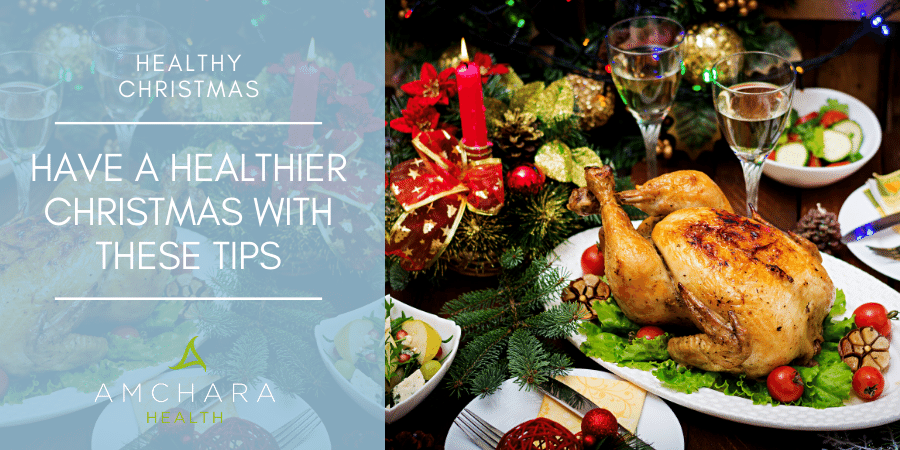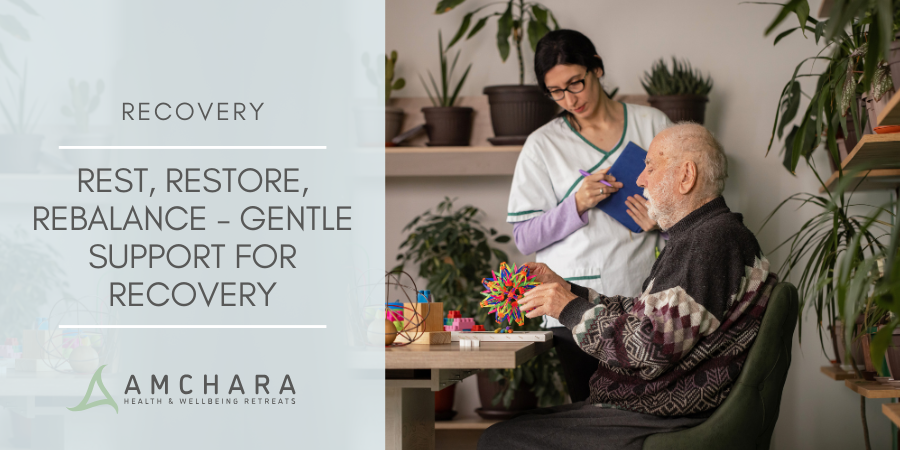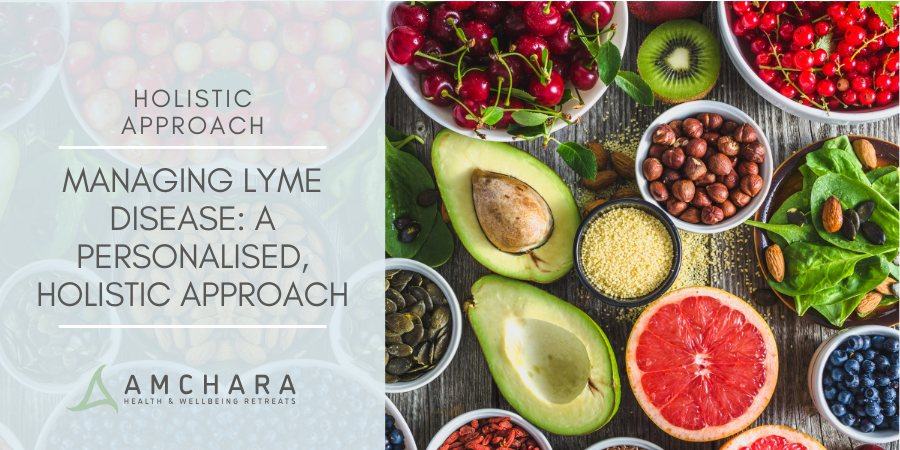Christmas is a time for giving, sharing and spending time with loved ones. It may be filled with celebrations and temptations to move away from normal routines or eating patterns, meaning you may not always make the healthiest choices.
The run up to Christmas and the big day itself does not need to be an unhealthy affair and making some simple changes can help you experience your healthiest Christmas yet.
Take a look at our 7 simple tips to have a healthy and happy Christmas.
1. Manage stress
Although Christmas brings much cheer it can be hard work! There is an increase in jobs ‘to do’ in the run up and it is important to prioritise. List the most important tasks you need to carry out or events you need to attend and set clear boundaries. Say no to invites if you really don’t have the time, and don’t feel obliged to do everything. Drop the guilt – your family and loved ones will still have a fantastic Christmas even if one or two events are taken off the calendar.
Don’t overspend – stick to your budget, financial worries are a significant contributor to stress levels. Keep Christmas presents simple, books, games, puzzles, charitable donations and handmade gifts often go down well.
If you are experiencing high levels of stress already and the festive season is adding to it, a herbal combination of rhodiola and ashwagandha may be helpful. These herbs are adaptogens that allow the body to deal with stress in a better way; they are known to improve energy levels, mood and also support the immune system (1,2).
2. Sleep well
The increase in festive preparations and celebrations can result in you burning the candle at both ends. Sleep is a time for your body to rest and repair – a good night’s sleep is vital for good health. Lack of sleep, poor quality sleep or disrupted sleep can negatively impact the immune system, increase stress hormones and influence inflammatory messengers in the body; this can have a significant negative impact on your overall health long term.
When it comes to achieving quality sleep a good routine may be important; although some research indicates that the average person should be getting 7-8 hours a night (3), other research shows it is the quality of sleep that matters. Sleeping soundly for 5-6 hours can be as restful as 7-8 hours of interrupted sleep for some people.
Getting up at the same time every morning helps you set your internal body clock which can influence your drive to sleep at night. Don’t be tempted to have a lie in or catch up with sleep at the weekend – this creates ‘social jet lag’, where your body becomes confused about when it should be sleeping. Make sure you are exposed to natural daylight before noon to help reset your internal clock.
3. Be active
Avoid being a couch potato. There may be some good films on television but a beautiful walk in the crisp countryside or down at the seafront can do you the world of good. Make it a tradition to go for a post-Christmas dinner walk. Or practice the Japanese art of Shinrin-yoku, forest bathing – a simple walk amongst trees stimulates your body and helps you adapt to stress more effectively, lowers blood pressure and improves enjoyment (4).
If time allows, keep up with your normal exercise routine – not only will this help you burn off any extra calories but it also encourages your blood to flow on a cold day and helps you keep seasonal stress at bay.
4. Have a mindful Christmas
It can be easy to be swept away with the festivities and stay later at parties than planned or have just ‘one more’ drink. Taking a moment to practice mindfulness this Christmas can help you increase enjoyment, reduce stress levels and make Christmas healthier overall.
So, be mindful when eating your delicious Christmas dinner and take your time. Savour the aromas and the flavours and chew your food slowly. This not only helps your digestion but also allows your brain the time it needs to register when you are full.
Take being mindful one step further and set aside ten minutes after your festive feast to sit down and meditate or use guided visualisations. A bit of quiet time can be just what you need to give yourself a little space and prepare for the after dinner games!
5. Think hygiene
The combination of winter viruses and social events, where you are in close contact with others, can result in picking up all the latest bugs. Remember to wash your hands regularly and if you have a slight sniffle, use a tissue to ‘catch it and bin it’ and then wash your hands to ‘kill it’.
Being prepared and taking black elderberry extract or echinacea can prime your immune system to deal more effectively with a virus and help you recover faster.
Be mindful of food hygiene also, this helps to reduce the incidence of food poisoning. Ensure all meats are stored and cooked properly, don’t leave leftovers sitting in a warm room and avoid overstuffing the fridge.
6. Stay hydrated
Remember to keep up your water intake during Christmas. A minimum 2 litres of water a day is required regardless of the time of year. There may be an abundance of festive drinks on offer like champagne, prosecco, mulled wine, sherry or port. If you want to be super health conscious then allow yourself one, maybe two at the most, and stick to hydrating drinks at other times.
Tea and coffee contain caffeine which is a diuretic and increases water loss so herbal teas, coffee substitutes like chicory root ‘coffee’ and water with sliced lemons or limes are better choices. It is even possible to find Christmas spiced rooibos tea or a vanilla spiced tea. There is no reason to miss out on a festive beverage, just be mindful of your alcohol intake.
7. Ditch your devices
Hands up if you are guilty of monitoring social media to see how others are celebrating. Social media can be a great way to stay in touch with friends and family who don’t live near you, but the constant ‘ping’ of notifications and feeling obliged to respond can interrupt your own festive celebrations. Using digital devices, be they smartphones or tablets, has been linked with an increase in anxiety, depression and poor sleep (5).
Make it clear to friends and family that you will be wishing them a Merry Christmas but will not be online or right by your phone all day. Place all devices in a box or drawer after this and enjoy your special day with your loved ones.
Takeaway
Christmas comes around every year, make each and every Christmas a healthy one by making our simple, healthy changes. If trying all 7 tips is not achievable then tackle 3 to start with, you can always build on this next year.
Christmas is not the only time of year to be mindful about your health and stress levels. If you would like to know more about how to tackle stress or improve specific health problems, a one to one consultation with a Personalised Health Practitioner can help guide you on the most beneficial changes to make for your individual circumstances.
A Personalised Health practitioner uses functional medicine principles and specific tests to assess the root cause of health issues and devise an individual programme tailored to your needs.
We’re dedicated to providing you with both insightful information and evidence-based content.
Did you find this article useful?
We’d love to hear your thoughts, get in touch!
Read this next:
- Hot flushes and the link with inflammation
- How oxidative stress and inflammation are linked to poor thyroid function
- Depression and inflammation
- Tackling depression with anti-inflammatory foods
- The brilliance of brassica vegetables
- Get the best of winter vegetables
- The benefits of eating seasonal spring vegetables




